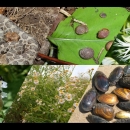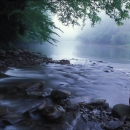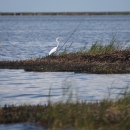States
IowaOn February 4, 2015, 15 cars from a Canadian Pacific train derailed into and along the Mississippi River two miles northeast of Balltown, Iowa. Fourteen tanker cars spilled an estimated 55,000 gallons of denatured ethanol into the Mississippi River and a nearby cold water stream. Three of the tanker cars slid down the railroad grade into the Mississippi River and onto freshwater mussel beds. Ethanol released from the derailed cars led to negative impacts to freshwater mussel beds that were found to contain state and federally listed species. The U. S. Fish and Wildlife Service is working with the Iowa Department of Natural Resources as co-trustees on the Natural Resource Damage Assessment and Restoration.
The U.S. Fish and Wildlife Service is in the process of updating webpages, so some content that was previously available is temporarily unavailable. Please contact the Illinois-Iowa Ecological Services Field Office for additional information.




